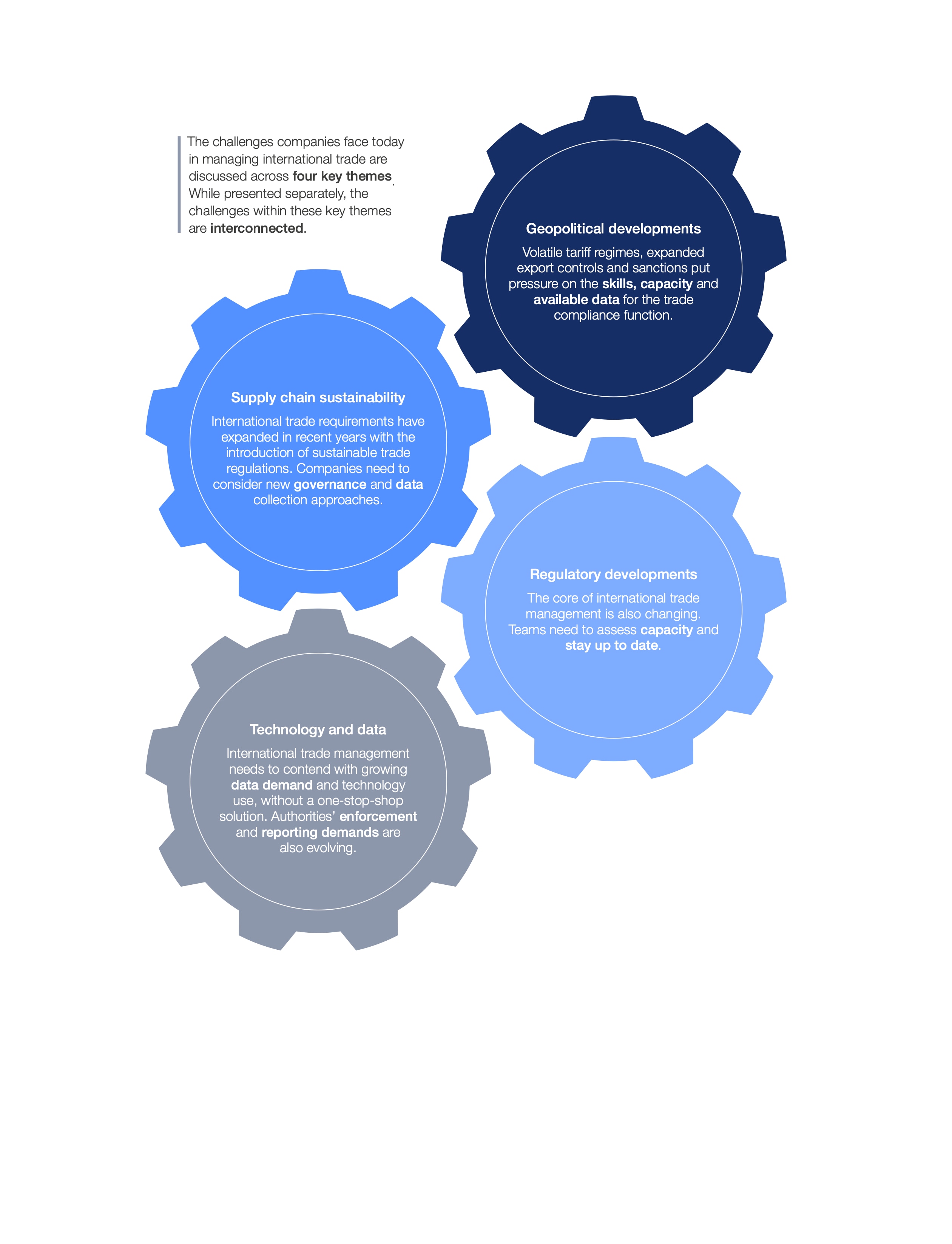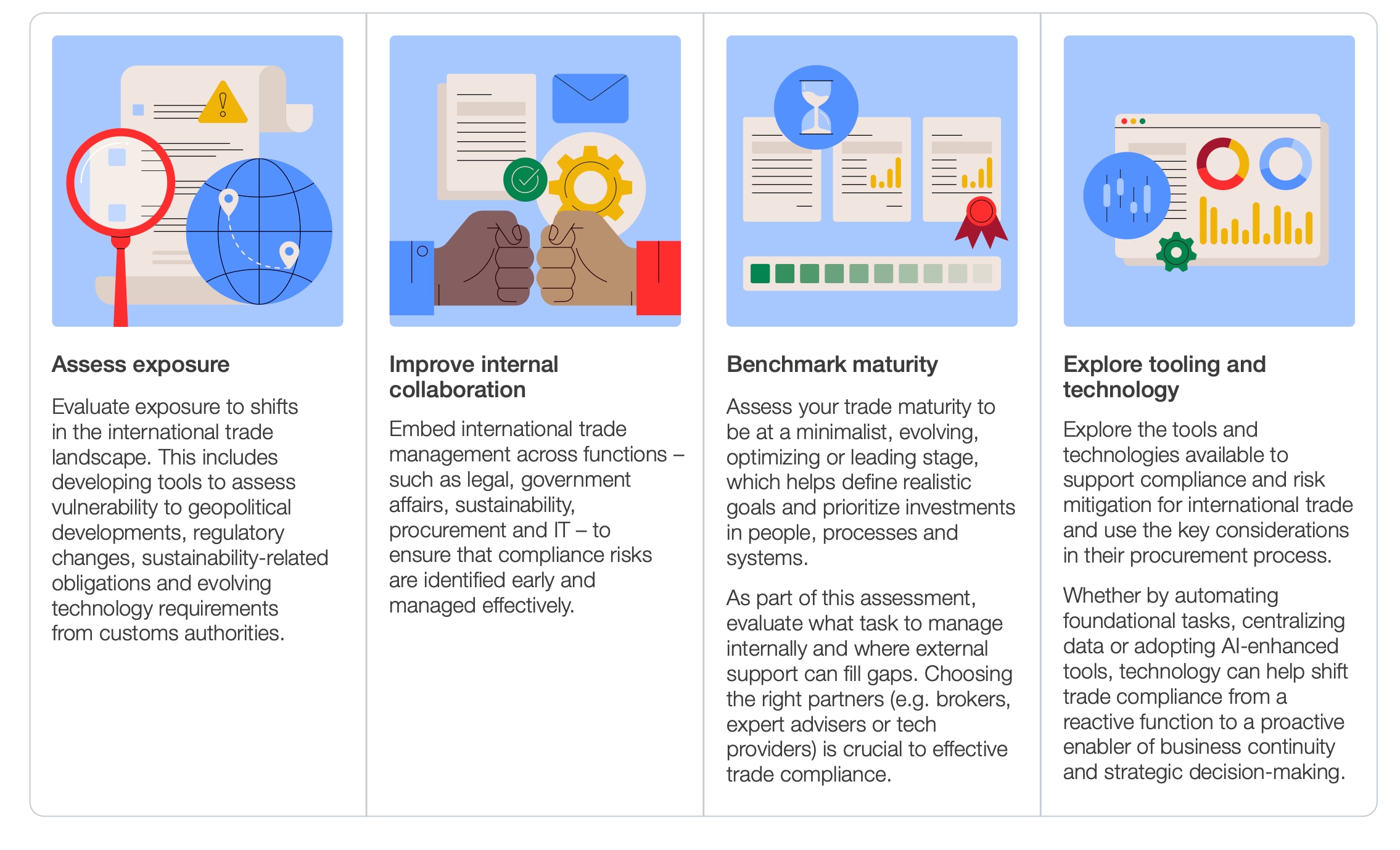
Emerging compliance requirements could disrupt hundreds of billions of dollars in trade flows. Image: SAHURI/Adobe.com
This article is part of:Centre for Regions, Trade and Geopolitics
- Global trade is being reshaped by geopolitical shifts, regulatory change and rapid technological disruption, increasing complexity and risk for companies.
- Emerging compliance requirements could disrupt hundreds of billions of dollars in trade flows.
- A new white paper by the World Economic Forum and PwC offers practical guidance and tools for navigating this landscape from business leaders.
The global trade landscape is undergoing a fundamental transformation, driven by geopolitical shifts, evolving regulatory frameworks and rapid technological change. As a result, companies face growing complexity and risks in managing international trade. The scale and potential impact of these changes are substantial, as they put hundreds of billions of dollars in trade flows at risk of non-compliance with emerging requirements.
In response to companies seeking practical guidance on managing international trade, a new white paper from the World Economic Forum and PwC, Trade Compliance for Leadership: Navigating a Shifting Global Landscape, offers key insights and tools from business trade leaders.
What are the risks?
The trade environment has become substantially more complex. Companies must now contend with a patchwork of evolving trade laws, unpredictability on tariffs, and new regulatory demands that reach deep into supply chains.

The impact of geopolitical developments are now a top concern for many companies, as the risks of failing to adapt a trade strategy to these shifts are significant. Companies may end up overpaying duties due to missed opportunities under preferential trade agreements or misclassification of goods. They may relocate production or sourcing in response to new tariffs or sanctions, only to discover downstream compliance implications that drive up costs and reduce efficiency.
“Today, the trade compliance professional has become a strategic advisor to the C-suite – essential to navigating the complexities of geopolitical conflict, tariff volatility, and emerging ESG expectations. This evolution isn’t temporary; the vital role of trade compliance is here to stay.”— Steve Johnsen, Vice President, International Trade Compliance, Bayer
A lack of visibility in trade data, or over-reliance on third parties, can result in missed early warning signs of regulatory change. In a volatile environment, the inability to respond quickly and strategically can lead to lost market access, shipment delays, or reputational damage.
Sustainability regulations present their own set of challenges. Non-compliance with emerging rules, such as the EU’s Carbon Border Adjustment Mechanism (CBAM), the EU Deforestation Regulation (EUDR), or the US Uyghur Forced Labor Act (UFLPA), can result in shipment delays, legal penalties, exclusion from key markets and reputational harm. Companies that lack visibility into upstream suppliers, especially beyond Tier 1, are exposed to regulatory breaches and supply chain disruptions.
Other regulatory developments – beyond sustainability and geopolitical shifts – also need to be considered. For instance, risks of non-compliance due to missed updates on new customs procedures, licensing regimes or classification rules.
Inconsistent interpretation of evolving trade rules across or even within jurisdictions can further derail compliance, particularly for companies operating in multiple markets and through multiple ports of entry. Additionally, without clear internal ownership or legal support, businesses may struggle to assess the impact of regulatory changes, leading to inefficient processes, duplicated efforts or missed opportunities to optimize duty payments and streamline operations.
Finally, while technology and data are increasingly central to trade compliance, they also come with their own risks. The reliance on digital systems and data-driven processes introduces operational and strategic challenges. Fragmented systems, inconsistent data formats, and limited integration can lead to inefficiencies, errors, and blind spots for compliance. Inaccurate or incomplete data can result in misdeclarations, missed duty savings, or failure to meet regulatory reporting requirements. Companies may invest in tools that quickly become outdated.
“In light of rising geopolitical risks and expanding regulatory demands, crisis prevention and trade compliance must be firmly anchored on the board’s agenda. As global trade shifts from liberalization to economic statecraft – with sanctions, export controls and investment screening reshaping the rules – boards must treat these instruments as strategic variables. Through scenario analyses, geopolitical risk mapping and strategic supply chain adjustments, boards lay the foundation for resilient and lawful operations. Their effectiveness in crisis scenarios will depend on strong cross-border leadership – because in today’s volatile environment, resilience isn’t reactive, it’s a strategic imperative.”— Anahita Thoms, Trade Partner and Co-Chair of the Global Crisis Management & Strategic Response Team, Baker McKenzie
Turning compliance into a competitive advantage
Within the key challenges also lie significant opportunities. Companies that invest in trade intelligence, scenario planning, and cross-functional collaboration can turn international trade management into a source of competitive advantage. Robust systems for tracking origin and tariff exposure enable companies to optimize sourcing decisions and reduce landed costs. Integrating geopolitical risk monitoring into supply chain planning allows businesses to pivot more effectively in response to new trade barriers or export controls. Those that demonstrate strong compliance capabilities are better positioned to engage with regulators, secure trusted trader status, and benefit from streamlined customs procedures.
Engaging proactively with sustainability regulations can also unlock strategic benefits. Companies that lead on compliance gain deeper supply chain insights, future-proof their sourcing, and enhance their brand reputation and investor confidence. Supply chain data collected for one regulation can often be repurposed for others, streamlining compliance processes and reducing duplication.
“In today’s complex trade environment, compliance is no longer optional – it’s the license to operate. Navigating tariffs, sanctions and evolving ESG regulations requires agility, and that starts with owning and managing end-to-end trade data. Companies must re-evaluate their partner networks and build trusted, digital ecosystems. Done right, trade compliance becomes a market advantage, turning risk into opportunity.”— Lars Karlsson, Global Head of Trade and Customs Consulting, A.P. Møller-Maersk A/S

Similarly, automating foundational compliance tasks and centralizing trade and sustainability data enables real-time insights, supports proactive risk management, and enhances cross-functional collaboration. AI-enhanced tools can support anomaly detection, regulatory monitoring, and predictive analytics, helping companies stay ahead of change.
To thrive in this new environment, companies should assess their exposure to shifts in the international trade landscape, benchmark their trade maturity, and define realistic goals for investment in people, processes, and systems. Embedding international trade management across functions – such as legal, sustainability, procurement and IT – ensures that compliance risks are identified early and managed effectively. Selecting technology tools that align with the company’s trade footprint and internal capabilities is critical for enabling compliance and risk mitigation.
“In an era of ever-changing trade sanctions regimes, establishing robust governance within organizations is crucial. Cross-functional collaboration and proactive engagement with policy-makers are essential to navigate the complexities of international trade and ensure compliance while fostering sustainable, long-term organizational success.”— Jochen Brodbeck, Trade Compliance Governance and Crisis Management, Novartis International AG
Ultimately, international trade management is no longer just about moving goods across borders. It is a strategic capability and companies that invest in maturing their trade capabilities today will be better positioned to navigate tomorrow’s trade realities, mitigate risks, and seize new opportunities in a complex and rapidly changing world.
Have you read?
- Global trade needs AI and leaders willing to invest despite uncertainty
- What's next for corporate sustainability rules in Europe?
- Digitalization is disrupting global trade – here's how AI can help customs and businesses to respond



